#Libertarian Party
Explore tagged Tumblr posts
Text

End the Fed the Libertarian way.
Less Government, Less Taxes, no more wars.
336 notes
·
View notes
Text
Well, RFK Jr. is all but admitting his campaign was a ploy to help Trump win, Republican operatives are committing fraud to get Cornel West on the ballot in Arizona, Jill Stein is openly talking up her genuine love for Vladimir Putin, and the Libertarian Party is such a wreck that my most openly libertarian friend has stepped back from their organization.
Is it time to admit that there is no genuine third-party option in America anymore?
#politics#us politics#trump#republicans#third parties#third party voting#cornel west#rfk jr#jill stein#libertarian party
192 notes
·
View notes
Text
fuckin. I was trying to find pictures/quotes for some shit post I was gonna do about Voltaire
it was about the famous quote:
"I wholly disapprove of what you say and will defend to the death your right to say it"
so I looked it up just to be double sure
And DID YALL KNOW THIS QUOTE IS FROM A WOMAN? AND SHE HAD TO APOLOGIZE FOR IT???

Her name was
Evelyn Beatrice Hall!!!


The famous quote is actually HER COMMENTARY based on what she was reading while she was translating a mass of Voltaire's letters.
From there, apparently people kept misattributing this quote that he never said...
and even though the way she quoted it made it fairly obvious it was from someone who WASNT Voltaire, and even though she put it with her OTHER COMMENTARY, she had to make an apology.
AN APOLOGY FOR COMING UP WITH THAT!!!
I'll be real I was gonna do a little goof on Voltaire, but this is so much more interesting lmao.
Like am I crazy or has this been attributed to Thomas Jefferson a lot??? I know back in the day I learned it was Voltaire...but damn! I've never once heard this woman's name and thats a shame.
#anybody wanna see my shit post anyways#too bad ur gonna#voltaire#politics#us politics#global politics#international politics#philosophy#aurelio voltaire#evelyn beatrice hall#voltaire quotes#libertarian#libertarian party#free speech#free speech absolutist
29 notes
·
View notes
Text
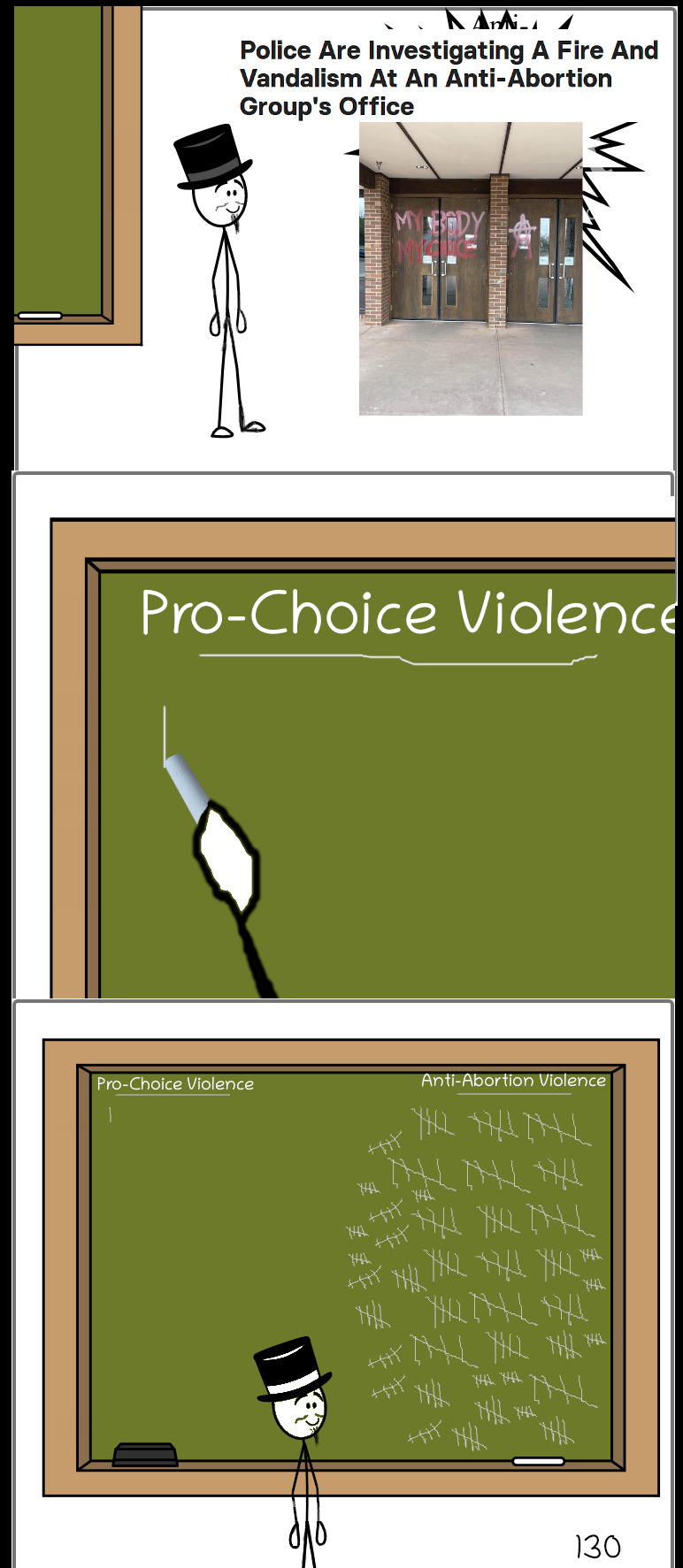
3panel I made about violence concerning the Anti-Abortion Movement.
#political humor#political memes#politics#fuck trump#don't tread on me#trump#conservatives#conservatism#libertarian#libertarian party#top hat#thehat taheht#pro choice#pro life#anti abortion#anti choice#abortion#reproductive freedom#reproductive rights#abortion bans#reproductive justice#abortion rights#130
102 notes
·
View notes
Text


#the muppets#muppet christmas carol#michael caine#ebenezer scrooge#a christmas carol#charles dickens#libertarian party
26 notes
·
View notes
Text
Blatantly Partisan Party Review VI (WA 2025): Libertarian Party
Prior reviews (all as the Liberal Democratic Party): federal 2013, VIC 2014, federal 2016, VIC 2018, NSW 2019, federal 2019, federal 2022, VIC 2022, NSW 2023, plus my friend’s b_auspol review for WA 2021
What I said before: “Welcome to the worst of far-right libertarianism, now with a generous helping of covid conspiracism. You have been warned.” (NSW 2023)
What I think this year: This party doesn’t deserve any oxygen. They are the sort of people who support Trump and Musk in the US and Milei in Argentina. If you have even two brain cells to rub together, you know this is a bad thing. One of the easiest ways to tell that somebody is a deeply unlikeable, bilious, unpleasant person is that they are a libertarian. Years ago, some people plausibly presented themselves as left-libertarians, but the term has long since become defined by the extremes of people who were once known as right-libertarians.
Possibly the only good thing I can say about the Libertarian Party is at least their name now identifies their ideology, but even that was forced on them: until they had to be frank and call themselves Libertarian, they enjoyed duping low-info voters looking for the Liberals and/or the Democrats with the name Liberal Democrats. Nothing better illustrates their desired dystopia: they want to be allowed to dupe and mislead people. Whenever you sit around wondering why certain laws exist because surely nobody is that terrible, it is because a libertarian would do it if they could.
Recommendation: Give the Libertarian Party a weak or no preference.
Website:https://www.libertarians.org.au/wa
#auspol#ausvotes#WApol#WAvotes#WA election#WA#Election 2025#Libertarian Party#god I am tired of reviewing this party#what a pack of charmless losers
8 notes
·
View notes
Text
by Jack Elbaum
The Libertarian Party of Michigan on Wednesday posted an antisemitic cartoon depicting Jews as puppet masters who control both the Democratic and Republican parties in the US.
The graphic was posted on multiple social media platforms, but gained particular traction on X/Twitter, where it received widespread blowback but also a chuck of support — garnering over 1,000 likes before it was ultimately deleted.
The Libertarian Party of Michigan did not respond to The Algemeiner‘s request for comment for this story.

“I know some people think of me as ‘libertarian.’ I have used that word to describe myself at times,” journalist Brad Polumbo wrote in response to the graphic. “But please understand that I have no affiliation whatsoever with whatever the f–k this is.”
22 notes
·
View notes
Text
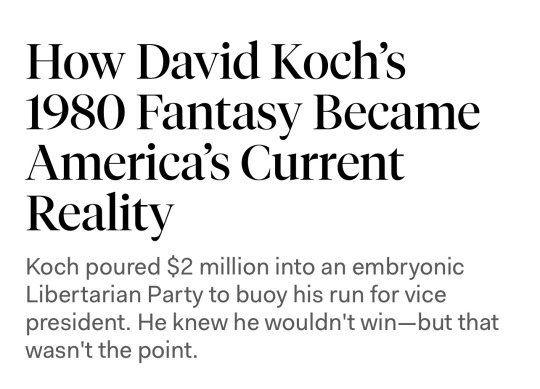
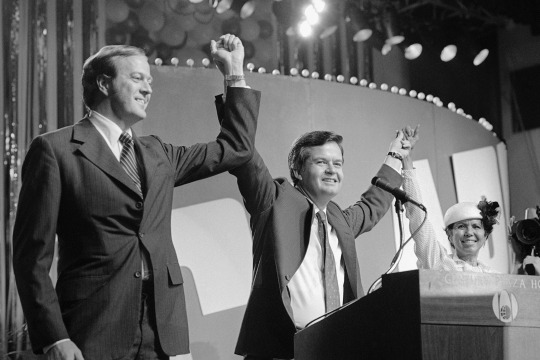
Billionaire fossil fuel mogul David Koch died August 23, 2019. Though he will rightfully be remembered for his role in the destruction of the earth, David Koch’s influence went far beyond climate denial. Ronald Reagan may have uttered the famous words, “Government is not the solution to our problem, government is the problem” back in 1981—but it was David Koch, along with his elder brother Charles and a cabal of other ultrarich individuals, who truly reframed the popular view of government. Once a democratic tool used to shape the country’s future, government became seen as something intrusive and inefficient—indeed, something to be feared.
“While Charles was the mastermind of the social reengineering of the America he envisioned,” said Lisa Graves, co-director of the corporate watchdog group Documented, “David was an enthusiastic lieutenant.”
David Koch was particularly instrumental in legitimizing anti-government ideology—one the GOP now holds as gospel. In 1980, the younger Koch ran as the vice-presidential nominee for the nascent Libertarian Party. And a newly unearthed document shows Koch personally donated more than $2 million to the party—an astounding amount for the time—to promote the Ed Clark–David Koch ticket.
“Few people realize that the anti-American government antecedent to the Tea Party was fomented in the late ’70s with money from Charles and David Koch,” Graves continued. “The Libertarian Party, fueled in part with David’s wealth, pushed hard on the idea that government was the problem and the free market was the solution to everything.”
In fact, according to Graves, “The Koch-funded Libertarian Party helped spur on Ronald Reagan’s anti-government, free-market-solves-all agenda as president.”
Even by contemporary standards, the 1980 Libertarian Party platform was extreme. It called for the abolition of a wide swath of federal agencies, including the Food and Drug Administration, the Department of Energy, the Environmental Protection Agency, the Nuclear Regulatory Commission, the Federal Aviation Administration, the Bureau of Land Management, the Federal Election Commission, the Bureau of Alcohol, Tobacco, and Firearms, the Federal Trade Commission, and “all government agencies concerned with transportation.” It railed against campaign finance and consumer protection laws, the Occupational Safety and Health Act, any regulations of the firearm industry (including tear gas), and government intervention in labor negotiations. And the platform demanded the repeal of all taxation, and sought amnesty for those convicted of tax “resistance.”
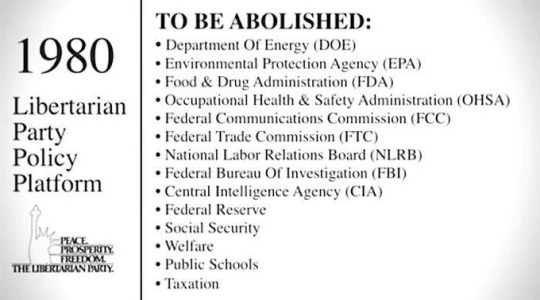
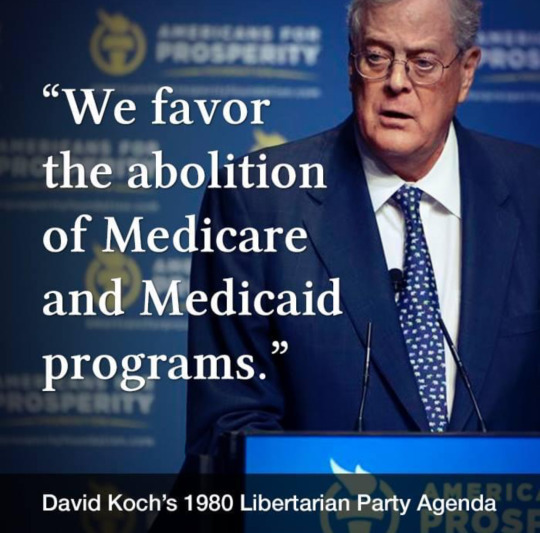
Koch and his libertarian allies moreover advocated for the repeal of Social Security, Medicare, Medicaid, and other social programs. They wanted to abolish federally mandated speed limits. They opposed occupational licensure, antitrust laws, labor laws protecting women and children, and “all controls on wages, prices, rents, profits, production, and interest rates.” And in true libertarian fashion, the platform urged the privatization of all schools (with an end to compulsory education laws), the railroad system, public roads and the national highway system, inland waterways, water distribution systems, public lands, and dam sites.
The Libertarian Party never made much of a splash in the election—though it did garner almost 12 percent of the vote in Alaska—but doing so was never the point. Rather, the Kochs were engaged in a long-term effort to normalize the aforementioned ideas and mainstream them into American politics.
(continue reading)
#politics#republicans#libertarians#koch brothers#koch bros#libertarianism#conservatism#ronald reagan#reaganism#charles koch#david koch#libertarian party
58 notes
·
View notes
Text

#green party#jill stein#democratic party#republican party#democrats#republicans#libertarian party#libertarians#democracy#politics#trump#Biden#robert f kennedy jr#cornel west
8 notes
·
View notes
Text

Ron Paul has entered the chat for DOGE
The wasteful government agencies are so fuct lol
17 notes
·
View notes
Text
(political) party animals!!!
ok so, an elephant, a donkey, a porcupine, and a sea turtle walk into a bar... [REDACTED] sorry everyone, that joke was kinda not PC, fuck the woke mob

btw, the sea turtle is supposed to represent the green party _it's kind of like their unofficial mascot)
#ms paint#ms paint art#us politics#political parties#republican party#democratic party#libertarian party#green party#animals#elephant#donkey#porcupine#sea turtle
8 notes
·
View notes
Text
Third Party Vote
A third party is any political party other than the dominant two in the nation - in the U.S.A., these are the Republican and the Democratic parties.
The third parties of the U.S.A. include the Libertarian party and the Green party.
Libertarian beliefs emphasize personal rights to property and participating in a free market. Generally, they do not align with progressive goals due to three key beliefs; everyone’s right to own guns; segregation of education standards; and voluntary taxes1. Overall, they want less government control.
Taxes are extremely annoying and inconvenient, and the allocation of them has not been optimal in many years, but the lack of them would cause extreme losses to programs that help people survive, including social security and certain healthcare plans2. Likewise, while decentralized education can have many benefits for students, the education disparities between states is drastic, and further decentralization will likely exacerbate education inequalities3.
But the purpose of this article is not to debunk the goals of specific parties. Instead, I aim to explain the unfortunate effects of third-party voting in general elections. Specifically, I will explain why some people prefer the Democratic party or the Green party, and why we must be careful when voting this year.
The U.S.A. Green party has goals of strong, definitive measures to address environmental degradation and climate change, institutions that perpetuate inequities, and unsustainable military practices4. Progressively, they are possibly the strongest pushers for change, and they criticize and claim to avoid the corruption and hypocrisy of the Democratic party.
The most likely Democratic candidate for presidency in 2024 is Joseph Biden. During his 2021-2024 presidency, Biden has made Medicare able to negotiate drug prices, including insulin which became capped at 35 dollars per month for seniors5. He also funded vaccination campaigns to address the COVID-19 pandemic, helped protect marriage equality for LGBT+ and interracial people, worked on achieving debt relief, and many more positive goals5. Most recently, he pardoned individuals federally charged with simple possession of marijuana, a major proclamation to correct some failures in the justice system15.
He has also been complicit in the genocide against Palestinian people, with his administration cutting off aid to Gaza while providing Israel munitions6. He has used the military to attack protests in the Middle East7. Additionally, the withdrawal of U.S. military forces from Afghanistan coincided with many service members’ deaths, and he has not achieved the cancellation of student debt that he aimed for8.
Problems with enacting change is that the Senate and the House of Representatives have a majority of Republican appointees, and six of the nine Supreme Court Justices were appointed by a Republican president. These demographics account for some of the issues regarding student loan debts and rights to autonomy and privacy, though Biden has worked to help constituents following the Supreme Court decision against Roe v. Wade5.
A Green party president would face similar setbacks, as checks and balances keep them from being able to completely dictate government decisions.
However, a Green party president such as Jill Stein would likely make good progress towards a more sustainable economy, equal rights, and alleviating climate change, based on her platform9. She would likely be a fantastic president. It is completely understandable why many people decide to vote for a third party, and why many young people, particularly on TikTok, say that they want to vote third-party.
I wish it was not this way, but current politics are not where they need to be for a third party candidate to win. A third-party candidate has never won the U.S.A. presidency before, even in their strongest years10.
When Jill Stein ran in 2016, the Democratic party won the popular vote but the Republican party won, and that responsibility is partially on third-party voters. If Stein’s voters had voted for the Democratic party, they would have won the electoral college11. Likewise, if every Democratic voter had voted for Jill Stein, the same would be true for the Green party.
Why is it fair to ask Green party voters to vote for the Democratic nominee instead of expecting Democratic voters to vote for the Green party, or for any ideal third party?
It isn’t. It is completely valid for people to want voting to be different. I am angry that I have to compromise on humanitarian values, as well. Politics should not be a two-party system. But not voting for Biden or whoever is the Democratic nominee creates an extreme risk of the Republican nominee winning, which would quickly send the U.S.A. further towards a loss of democracy and people’s rights.
Historic trends do not reflect positively on third party chances this year11. The Democratic party is giant and well-established with over 45 million loyal members unlikely to even consider a third party12. Voting for a third party is most likely to be considered a vote ‘stolen’ from one of the dominant parties13.
Keep in mind, these warnings are only pertaining to the presidency. Third parties have much higher likelihoods of success in smaller elections, such as city councils and mayoralties14. Hopefully, these trends will continue and the presidency will eventually not have to be as much of a compromise.
You are not wrong for wanting change. You are not wrong for being unsatisfied with inept government demographics. Continue to advocate for the nominees you most believe in, and please keep in mind the risks involved.
Additional Resources
1. https://www.lp.org/issues/
2. https://www.cbpp.org/research/policy-basics-where-do-our-federal-tax-dollars-go
3.https://learningportal.iiep.unesco.org/en/blog/learning-from-a-decentralized-education-system
4. https://www.gp.org/
5. https://www.whitehouse.gov/therecord/
6.https://www.washingtonpost.com/opinions/2024/01/30/biden-gaza-food-aid-hamas-civilians-strategy/
7.https://www.whitehouse.gov/briefing-room/statements-releases/2024/01/11/statement-from-president-joe-biden-on-coalition-strikes-in-houthi-controlled-areas-in-yemen/
8. https://www.washingtonpost.com/politics/2022/10/22/joe-biden-presidency/
9. https://www.jillstein2024.com/principles
10.https://www.brookings.edu/articles/how-younger-voters-will-impact-elections-responding-to-the-challenges-of-third-parties/
11.https://www.vox.com/policy-and-politics/2016/11/11/13576798/jill-stein-third-party-donald-trump-win
12.https://news.gallup.com/poll/512135/support-third-political-party.aspx
13. https://theintercept.com/2024/01/22/biden-trump-president-election-third-party/
14. https://www.gpelections.org/greens-in-office/2023-july-01/15. https://www.justice.gov/pardon/presidential-proclamation-marijuana-possession
#voting#politics#us politics#american politics#elections#2024 elections#green party#libertarian party#third party voting#climate change#article#democratic party#democratic primary
13 notes
·
View notes
Text
Andy Craig at The UnPopulist (05.24.2024):
Though libertarianism as a political philosophy will continue, there is no longer anything resembling a coherent libertarian movement in American politics. That’s because the movement still bearing its name is no longer recognizably libertarian in any meaningful sense of the term. Nor can it still claim to be a political movement, which implies an association organized around not just a consistent set of ideas but a distinct political identity. For over a decade now, since Trump has dominated the national stage, longstanding disagreements have boiled over into a complete schism. There are those who have effectively become adjuncts of MAGA, and some who have gone firmly in the opposite direction, while others took a stance more akin to anti-anti-Trump voices who neither endorse nor firmly oppose the former president but train their ire toward those opposing Trump.
Movement libertarianism has always been a distinctly minority faction in American life, often on the fringes. But it has also had its moments of influence since it emerged as a distinct political affiliation in the post-World War II era. In the process, a constellation of loosely and mostly informally affiliated organizations—of which the Libertarian Party was one—formed what could be called a cohesive, if often fractious, political movement. Understanding this turn of events, and what it means for the future, requires tracing internal libertarian disputes that began long before the rise of Trump. In some ways, they are a microcosm of similar developments in the American intellectual landscape writ large. Not just the implosion of a minor fringe party, the L.P.’s de facto endorsement of Trump shows important currents that will shape the ideological content of both the right and left for decades to come. The libertarian movement may be a thing of the past, but, like many movements before it that have come and gone, its influence—both for the better and for the worse—will not disappear.
From Fringe to … Somewhat Less Fringe
In his 2007 history of the movement, Radicals for Capitalism, Brian Doherty identifies five key figures who most shaped the nascent ideology and its organized advocacy: author Ayn Rand, and economists Ludwig von Mises, F. A. Hayek, Milton Friedman, and Murray Rothbard. Though they exhibited substantial differences, each of these figures set out a general vision of what can be called libertarianism (though their attitudes toward that label varied). While other luminaries—such as Robert Nozick and Leonard Read—also made important contributions, most libertarians are primarily in the mold of one or more of Doherty’s essential five.
It’s not surprising that the influence of these foundational advocates has diverged and become more complicated, simply by the passage of time. The eldest of them, Mises, passed away in 1973. Only Friedman, who died in 2006, lived to see this century. Many of their differences turn on questions of economic methodology and abstract philosophy. But these are largely beside the point to the more concrete political valence each embodied. With one exception, all paired radical free-market and smaller government views with liberal tolerance and cosmopolitanism on social issues. None were religious, and Rand and Mises were both avowedly irreligious. Friedman and Hayek both trended more moderate and pragmatic, and also achieved the highest degree of mainstream intellectual recognition as demonstrated by their Nobel prizes.
It was in Rothbard that the divergence began which today has culminated in the Libertarian Party’s convention transforming into a literal Trump rally. He was in many ways the most radical—an avowed anarchist—and the most marginal, never achieving mainstream prominence. But he was also the most involved in creating a self-consciously libertarian movement and many of its institutions. In this he was aided by his skills as a prolific polemicist. Towards the latter part of his career until his death in 1995, Rothbard took a turn into the illiberal hard right. He branded this proposed strategy paleolibertarianism, a name which has stuck even as its advocates have variously embraced or dropped it. As he outlined in a 1992 essay, “Right Wing Populism: A Strategy for the Paleo Movement,” paleolibertarianism was an explicit alliance between small-government radicalism and the extremist far-right.
By accommodating and embracing conservative culture warriors, even including avowed white supremacists, Rothbard believed he was forming the basis of a political coalition to demolish modern big government—an early version of “drain the swamp,” as it were. This went so far as to lament the loss of David Duke, a former grand wizard of the Ku Klux Klan, in Louisiana’s 1991 gubernatorial election. And it included an open embrace of police brutality, fuming about the need to “dispense instant punishment” to “bums,” while railing against efforts to undo America’s white supremacist past. Later, opposition to immigration became one of the paleo posture’s signature issues. Over the latter half of the 20th century, some more right-leaning mainstream libertarians eschewed the more socially liberal side of the philosophy, particularly on issues of race and civil rights. Many were more amenable to the “fusionist” vision of libertarianism as part of the regular conservative coalition. Others embraced the leading edge of the gay rights movement, the fight to end the war on drugs, and other issues of individual freedom. But only in Rothbard’s vision, and those who followed it, did courting the authoritarian far-right become the centerpiece of the agenda.
[...]
From Tactical Bigotry to Actual Bigotry
It was in the fever swamps of the Trumpist neo-right that the Libertarian Party’s demise began. After the deadly 2017 neo-Nazi rally in Charlottesville, the then party leadership denounced the “blood and soil” rhetoric. But to the Rothbardians, this smacked of unacceptable wokeness. Within a few days, the Mises Caucus—named more for the ideas exhibited by the think-tank than the actual economist—was founded. Over the next few years, this group began launching hostile takeovers of state parties and then the national party. As they did so, the party increasingly adopted rhetoric that sounded more like the tiki-torch brigade than one committed to individual liberty.
With this transformation has come an increasing unease with the word “libertarian” in some quarters, especially among those repulsed by the recent antics of the L.P. Though it was never the central pillar of the movement, the party retains the most prominent use of the term. It’s right there in the name, and on ballots across the country. For those who took a dim view of Trumpism, especially after Jan. 6, self-describing as libertarian came to have more baggage than it was worth. In their view, Trumpism was an authoritarian cult of personality, rank demagoguery, even something approaching fascism. Increasingly, those in this group have returned to the use of the word “liberal.” (The UnPopulist is firmly within that camp.) Hayek himself had grumbled that he preferred this term, and that “libertarian” was an ugly neologism arising out of the confused American terminology that conflates “liberal” with the welfare-state left. But around the world, “liberal” retained its more classical connotation, which has started to seep back into American discourse. If everywhere else the term refers to the sensible, socially tolerant, pro-market bloc, why not in the United States?
At the same time, the Trump effect was working its larger realignment of American politics. A minority of traditional Republicans peeled off into the “Never Trump” camp. The libertarian movement was not immune to this realignment along pro-Trump and anti-Trump lines. The two camps within the movement—the cosmopolitan and the paleo—already strained to nearly the breaking point, went through the inevitable rupture. A number of differences and disagreements fueled the split, but most central was the divide into MAGA-friendly and anti-Trump sympathies. Some were caught in the middle, unwilling to prioritize the rise of Trump as a fundamental threat to liberal values above more traditional policy disagreements. But as the sorting dynamic continues, this number is dwindling, getting pulled into one or other camp.
Donald Trump may have helped destroy the relative cohesion of the Libertarian Party and maybe the libertarian movement too.
#Donald Trump#Libertarianism#Libertarian Party#Murray Rothbard#Friedrich Hayek#F.A. Hayek#Ludwig von Mises#Milton Friedman#Ayn Rand
12 notes
·
View notes
Text
Donald Trump spoke at the Libertarian Party convention. That was made possible by some pro-MAGA elements gaining control of the Libertarian leadership. That didn't stop Trump from getting a lot of boos.
If Donald Trump came to the Libertarian National Convention to make peace on Saturday, it could hardly have gone worse. Within minutes of beginning speaking — and after enduring sustained jeering and boos — the former president turned on the third party, mocking its poor electoral record in presidential elections even as he appealed to them for their endorsement. “What’s the purpose of the Libertarian Party of getting 3 percent?” Trump asked the crowd, which proceeded to pelt him with jeers. “You should nominate Trump for president only if you want to win.” The libertarians in attendance didn’t want to hear it, as hecklers chucked insults at Trump all night. “Liar,” they called him. “Panderer,” they shouted. “You crushed our rights,” they belted.
Why would a political grouping committed to personal liberty welcome somebody who bragged about his appointees to the US Supreme Court killing the federal right to abortion?
In his own words...
youtube
Somebody who wants to tell people what they can do with their bodies is not exactly dedicated to personal freedom.
#republicans#donald trump#libertarian party#trump gets booed#abortion#roe v. wade#trump killed roe#reproductive freedom#a woman's right to choose#restore roe#election 2024#vote blue no matter who
7 notes
·
View notes
Text

#it was this sorry#voltaire#libertarian party#libertarian#politics#us politics#free speech#free speech absolutist#global politics#international politics#censorship
2 notes
·
View notes
Note
Okay genuine question then. Should i not vote.
Do i sit back and let the genocidal maniac who is set on ruining everything EVERYWHERE win. Or do i try and sway it to the genocidal maniac who is at least advocating for my ability to afford food.
Thats the decision im faced with here. If you have any suggestions i am more than open to them! we just. dont have many options.
I dont disagree with you, theyre both horrible. But one of them will win either way. This is a "lesser of two evils" situation, and you either watch everything burn or try to sway it to the person who has at least ONE thing you support. there's unfortunately no magical third option that fixes everything. I'm open to suggestions, believe me, we are genuinely looking for them.
How many times do we need to have this conversation before you people realize that the "lesser of two evils" is just a sham, both parties are equally evil and have equal amount of blood on their hands? They just brainwashed you idiots into believing you will actually be able to "afford food" under one of them when both of them will gladly have you starve to death as long as they can keep dropping bombs over innocent civilians half-way across the world because they know most of you will continue being divided into voting one of them without ever considering the possibility of voting for a 3rd party that will not prioritize imperialism in the global south over their hungry citizens.
Which is why you're asking if not wanting to vote for democrats means you shouldn't bother going to the voting booth at all, its 2024 and your brain still can't comprehends that you have the right to vote for a 3rd party and that's exactly why your 2 parties system (which in reality is actually just a one party system) managed to last so long.
And I'm not an idiot, I know how hard it is for a 3rd party to win elections and that it's not something that can happen over-night, but there's a start for everything and unless you're willing to continuously invest in a 3rd party for a long period of time so that they can gradually grow in numbers then nothing will change.
Do I believe a 3rd party might win this elections or even the next elections? Probably not, but it doesn't change the fact that the green party (as well as the Libertarian party) is more popular than ever now and that US's unconditional support for history most-documented genocide in Gaza as well as how AIPAC gleefully publicly announce how literally all the candidates they finance have won their elections has made more people wake the fuck up and realize realize how broken and corrupted their system is and how voting 3rd party is the only way to fix it and who knows? Maybe voting 3rd party, even if it will not results in them winning, might influence the other 2 parties to start adopting similar policies to the green party, not because they actually care about innocent people dying, but in hopes they can lure 3rd party voters into coming back to vote for them.
So until that day comes, I will continue clowning people who support either republicans or democrats because that's the only way to grow numbers for a 3rd party and if you still don't believe me and genuinely still believe that the US's government literally can NOT be run by non-war criminals? Then the US simply shouldn't exist and I pray another superpower will come and destroy it in the future, after all why should the lives of American citizens (who don't want to put any efforts into stopping their government from using their tax money to commit more war-crimes and state-sponsored terrorism) be worth more than non-Americans?
Again, assuming what you think about the 2 parties system being unchangeable is true, which I personally don't believe.
5 notes
·
View notes